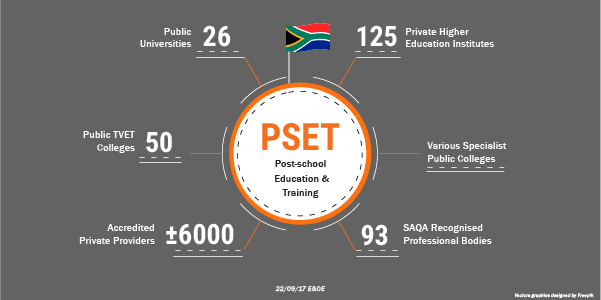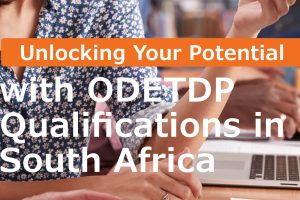Getting to grips with the SA post-school education and training system

What is the post-school education and training (PSET)?
In South Africa, the writers of legislation and associated regulations talk about a schooling system and a post-schooling system. The schooling system [grade 0-12] is well understood and reasonably easy to navigate.
The post-school education and training [PSET] system on the other hand is more complex, not that well understood and not as easy to navigate. In broad terms PSET encompasses ALL teaching and learning [formal, non-formal and informal] that takes place once a person is out of school. A comparative-term that is probably more well-known but actually not that well understood is tertiary education.
The formal SA PSET system incorporates 26 public universities, 125 private higher education institutions, 50 public TVET colleges, various specialist public colleges such as agricultural colleges, an estimated 6000 accredited private providers and 93 SAQA recognised professional bodies. Choosing the right learning organisation to support your life-long learning journey needs careful consideration and wise counsel.
The SA National Qualifications Framework [NQF]
In South Africa, all formal [registered and accredited] learning is required in terms on the NQF Act 67 of 2008, to be aligned to the SA NQF. Its therefore important to understand the SA NQF and to know where your qualification/s fit. The SA NQF has 10 levels. A grade 12 school leaving certificate [e.g. NSC, commonly known as matric] is pegged at NQF 4. A three-year bachelor’s degree at NQF 7, and a doctorate [PhD or DLitt] at NQF10.
If you do choose to study towards a particular qualification make 100% sure the qualification is registered on the NQF and is current. You need to then make sure the provider of the chosen programme is registered with the Department of Higher Education and Training and accredited with the relevant statutory quality council. Take care when enrolling for a qualification that you establish the NQF level and associated learning credits. It can be that the name of the qualification promises more than the NQF level it is pegged at!
Recognition of prior learning [RPL]
In South Africa, the NQF Act entrenches RPL as a recognised specialist pedagogy. What does that mean? In plain English, it means that if a person has gained knowledge/skill/competency in a particular field it is not necessary to go through a process of starting learning from the beginning again. All duly registered and accredited SA PSET institutions should be proficient in RPL pedagogy and be able to take the learner through a valid and thorough RPL process and ultimately recognise that learning.
RPL is applicable to a range of situations. These include:
- RPL for a promotion [where the job specifies a certain minimum qualification that the candidate does not have but they actually have gained the required competence experientially].
- RPL for access to a formal learning programme [where a person does not have the prerequisite entry qualification but they are clearly capable of entering the course].
- RPL for credits [where a person already clearly knows part of a qualification and wants part or full exemption].
- RPL for designation [where a person applies to a professional body for a designation and they don’t have the prerequisite underlying qualification but is capable of serving the designated profession].
Please note: RPL is not a ‘clever’ way of getting a job/qualification/designation without having/proving the competence. RPL is a rigorous process. However, it is a valid tool that can help you move up the ladder quicker if you really do qualify for RPL.
Verification of qualifications
In South Africa, qualifications are not always what they claim to be. The one organisation that is geared up to verify qualifications is the South African Qualifications Authority [SAQA]. It is well known that they are the only statutory body that can validate a foreign qualification; it is less well know that they also verify SA qualifications.
What does verification mean? For a foreign qualification it means they [SAQA] have checked that the person attained the qualification and they have stated what SA qualification the foreign qualification is most similar to.
For a SA qualification, they also confirm the person achieved the qualification and they specify the qualification and the SAQA ID, which provides deeper insight into what competencies the person has.
More recently people are claiming internationally recognised qualifications that are not accredited by a recognised qualifications body of a country. These so-called internationally recognised qualifications are not worth much unless they can be linked to a country and its qualification approving body.
Sector Education and Training Authorities (SETAs)
In SA, there are 21 SETAS. They serve the entire spectrum of society from the arts, to the sciences, to business and commerce. SETAs are set up to support, fund and accelerate skills development in SA. They also provide a useful framework for citizens to think through the opportunities in the world of work. Should a person for example conclude the want to work in the IT sector they should visit the MICT SETA website and research the scarce and critical skills in this sector. They could also apply for a learnership or bursary via the SETA.
Another example could be that someone is keen to become a motor mechanic. That person should look more closely at the MERSETA website to find out more. These are just two examples. There are 19 other SETAS. Making the right career and learning choices is vital for a prosperous life. While some of the SETAs may not be the most well-regarded organisations currently, this should not stop a person from using the information and funding they provide to get ahead in life.



1 Comment
I would like to enroll for Assessor Course. Iam a Civil Lecturer at Elsngeni College, Ndwedwe Campus